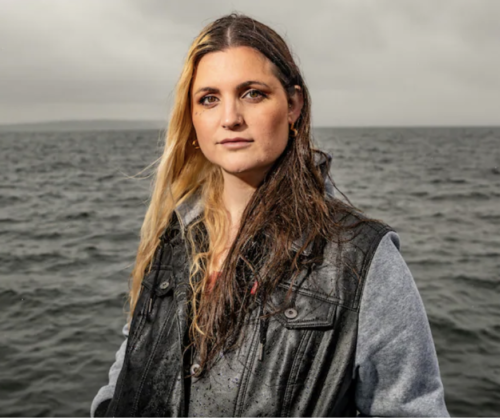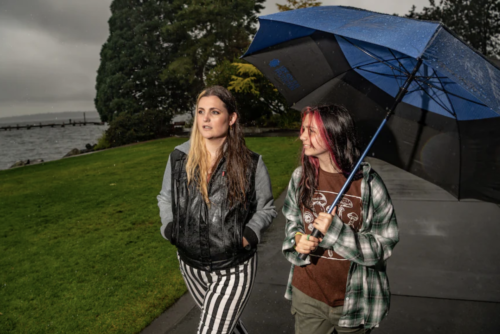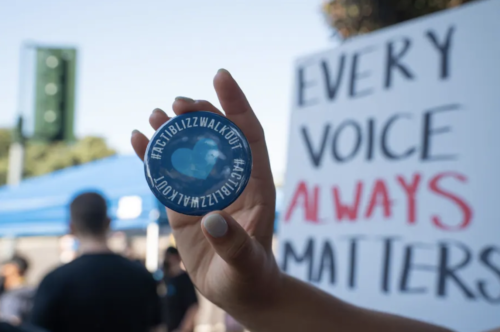
She pulled herself from addiction by learning to code. Now she’s leading a worker uprising at Apple.
By Reed Albergotti, Washington Post, October 14, 2021
https://www.washingtonpost.com/technology/2021/10/14/apple-worker-cher-scarlett/
Cher Scarlett grew up poor and dropped out of high school. As a teenager, she struggled with addiction, danced as a stripper and tried to overdose on pills.
Her ticket to a better life was learning to code. Last year, she became perhaps the least probable member of Apple’s elite software engineering corps.
But the storied tech giant, Scarlett says, turned out to be a place that blithely enables discrimination against women and other historically underrepresented groups, including disabled people.
So, despite her plush new salary and a newfound sense of financial security, Scarlett, 36, says she decided to speak out, becoming one of a tiny number out of tens of thousands of Apple employees to publicly criticize the company.
“Apple does not care about its employees. It cares about money,” Scarlett said in an interview. “Maybe that’s capitalism, and that’s just the way corporations are. But I can’t live my life further accepting it and not saying something about it.”
Apple declined to comment on her specific allegations or specific employee matters, and said it is committed to a positive and inclusive workplace.
Scarlett’s story as told to The Washington Post is part of a growing chorus of tech workers — many of them women — challenging the power centers of Silicon Valley, where some of them allege companies are still run like frat houses and discrimination against women and racial minorities continues to make headlines.
In recent years, more than 20,000 Google employees staged a walkout to protest sexual misconduct and inequality, while Black women at Pinterest accused the company of discrimination and retaliation.
Just last month, Amazon settled a wrongful termination suit against two women it fired after they publicly criticized the company’s climate policies.
Last Tuesday, former Facebook employee Frances Haugen became the highest profile tech whistleblower of all when she testified before Congress that Facebook misled the public about the harm caused by its products.
“This is an industry with a pronounced racism and misogyny problem,” said Meredith Whittaker, a former Google employee who helped lead the walkout there.
Whittaker, as well as Timnit Gebru, who was fired from Google after she raised questions about the ethics of its artificial intelligence ambitions, has spoken with Scarlett about her efforts. Gebru said the way the tech industry is covered by the media, which to her deifies tech leaders, helps shield tech companies from scrutiny.
“There’s just no accountability,” she said.
The activists have chalked up some victories.
In January, Google employees formed a union, a rarity in an industry that generally pays well and rewards employees with stock options worth hundreds of thousands of dollars.
Meanwhile, California courts had begun whittling away at the power of nondisclosure agreements, an essential element of a top secret culture that publicly punishes dissenters.
Large companies, though, still have the upper hand. Most tech employees fear speaking about the companies they work for, lest they be discovered by myriad corporate surveillance techniques that have only gotten more sophisticated with new technology.
Nowhere is that more true than at Apple, whose CEO Tim Cook, in the wake of employees speaking out about working conditions, sent a companywide memo about the company’s efforts to ferret out leakers.
That began to change this summer, with the rise of the #AppleToo movement.
In largely anonymous testimonials, more than 500 employees — many working at Apple’s more than 500 global retail stores — have accused the company of erecting “an opaque, intimidating fortress” that tolerates “racism, sexism, discrimination, retaliation, bullying, sexual and other forms of harassment.”
Scarlett has become the face of the #AppleToo movement, a role that evolved from her brutally honest presence on Twitter, where she goes by @cherthedev and has amassed 46,000 followers.
On Twitter, Scarlett has openly discussed the messy details of her life, and her feisty presence on the platform has quickly made her a magnet for Apple colleagues having difficulties with the company.
She took to Twitter to encourage women to come forward with stories of sexual harassment at her former employer, Activision Blizzard, and called out an alleged pay gap at Starbucks. “I began to recognize this power of this platform that I have,” she said.
Scarlett, who says her mental health has suffered as a result of the harassment she has received from some of her colleagues at Apple, is now on paid medical leave and has retained an attorney who is representing her in negotiations with Apple’s lawyers.
“I’m not a corporate shill, but I’m also not throw-away-my-job idiotic,’” she said. “I have to feel good about what I’m putting into the world, whether that’s in my job or on social media, whatever. I have to feel good about it. And if I don’t, I have to remedy it immediately.”
“We are and have always been deeply committed to creating and maintaining a positive and inclusive workplace. We take all concerns seriously and we thoroughly investigate whenever a concern is raised and, out of respect for the privacy of any individuals involved, we do not discuss specific employee matters,” said Apple spokesman Josh Rosenstock in a statement.
Scarlett has support from some of her colleagues, most of whom she says will not speak to reporters, for fear of harming their careers.
“She’s doing it because she believes in doing the right thing for people and making sure the company we work for is doing the right thing,” said Janneke Parrish, a program manager on the Apple Maps team who has helped organize the #Appletoo initiative.
Parrish has talked to Scarlett about her troubled past and how it drives her desire to fight what she sees as injustice.
“It is an incredible story,” Parrish said. “She’s a deeply inspiring figure.”
In a series of interviews with The Post, Scarlett described growing up in Kirkland Wash., and being a junior astronaut who wanted to become a scientist and go to space.
An avid gamer who created a website for her “guild” in the role playing game Everquest, Scarlett says she studied for the SAT and got a near perfect score.
But her family was poor, she said.
Her mother worked for a construction company and her father and stepfather came in and out of her life, she said.
Though her memory is fuzzy, she said she was sexually abused as a young child by a family friend.
In high school, she began experimenting with drugs and began stripping at 18 to pay for a cocaine habit.
Scarlett says she was forced to perform sex acts on camera at 19.
Days later, she says she attempted suicide.
She provided information to federal investigators in 2018, which led to the arrest of the perpetrator, and began going by Scarlett, which is not her real name, out of concern for her safety. She is in the process of legally changing it.

Cher Scarlett walks along Lake Washington with her daughter Lexi, who is 14. (Stuart Isett for The Washington Post.)
She got pregnant at 21, and the decision to have the baby forced her to clean up her act, she says.
In 2007, she was pregnant and living in Kirkland, Wash., when she noticed an ad for a web developer position at Luxuryrealestate.com in Seattle.
Scarlett had taught herself how to code and dabbled in web development on an early blogging platform called LiveJournal, she says. She could only afford a dial-up connection, so she built the journals and other websites from scratch with more efficient code, instead of using slow, balky programs like Adobe Flash.
“It wasn’t even on purpose,” she recalls. “It was like I can’t use websites. They take too long to load.”
So Scarlett built a website specifically for the real estate position, calling herself a “front end developer,” a term that describes someone who specializes in the code that powers how websites look.
She got the job and soon gave birth to a daughter, Lexi, whom she is raising as a single mother in Kirkland today.
Later that year, she quit to freelance, tumbling back into making self-destructive decisions.
In 2009, she said she tried heroin for the first time and began passing bad checks.
She says she never got caught, but is still in debt from financial decisions she made at the time.
She spent two years in this fog before pulling herself out of the spiral and starting to freelance again.
Then, one day in 2011, a recruiter from USA Today reached out about a web development opening.
The company flew her to Tysons Corner in Virginia for an interview and put her up in a hotel, where she was asked to show a credit card or put down a $100 deposit.
She had $23 in her pocket. The hotel let her check in, but only after emptying the minibar, she said.
She got the job, along with a five-figure signing bonus — an experience she described as surreal.
“How do you just all of a sudden have the thing you need?” she said. “It felt very dissociated and detached from reality, like in someone else’s life.”
In 2015, Scarlett was recruited by Activision-Blizzard, maker of the hugely popular game “Call of Duty,” to work at the company’s Los Angeles offices.
Last month, the company confirmed that it is under investigation by the U.S. Securities and Exchange Commission for its handling of allegations of sexual harassment and gender-based discrimination.
At Activision Blizzard, Scarlett said the reality of being a woman in an industry dominated by men began to sink in.
In 2016, she said she went to human resources to ask why men doing similar work at the company received higher salaries and signing bonuses while she did not, she says. Nothing happened.
“I was starting to know my value, what I bring to a company,” she said. “I was kind of starting to put together this puzzle that I don’t think at the time I necessarily realized I was putting together, but I really was finding myself.”

An employee holds a #ActiBlizzWalkout button during a walkout at Activision Blizzard offices in Irvine, Calif., July 28, 2021. Activision Blizzard Inc. employees called for the walkout to protest the company’s responses to a recent sexual discrimination lawsuit and to demand more equitable treatment for underrepresented staff. (Bing Guan/Bloomberg News)
Jesiah McCann, Scarlett’s manager at USA Today, said she was a talented developer.
Chris Giroir, Scarlett’s manager at Activision Blizzard, called Scarlett an “incredibly driven” employee and a great colleague who “shows passion with every project she works on and she doesn’t stop until she gets it right.”
Scarlett went on to work at World Wide Technology, a technology services provider based in St. Louis, then became a lead software engineer at Starbucks, where she joined a successful campaign to address a long-standing gender pay gap.
For the first time, Scarlett also began going to therapy, she said.
Since she was a kid, various psychiatrists and psychologists had diagnosed her with bipolar disorder, but she did not believe the diagnoses.
Now, she began addressing it and learning how to cope with it.
When Scarlett left Starbucks, she wrote a blog post criticizing the company for paying lower salaries to workers in geographies with predominantly Black and underrepresented groups.
It was then that she began to build an online reputation as an activist for workers rights.
In 2019, she left Starbucks for Webflow, a website design company, and wrote a Medium post advocating better pay equity for underrepresented groups.
In November that same year, Scarlett connected on Twitter with Devon Lindsey, an engineer at Apple, who said Scarlett was underpaid and wanted to help find her a position at Apple.
Lindsey followed through in February, recommending Scarlett for a job on the Apple security team, which builds software products for internal use at the company.
Lindsey declined to comment. The job offered a $170,000 salary — $23,000 more than Scarlett was then making — and the promise of $128,000 in Apple stock over four years. There was also a $10,000 signing bonus.
When Scarlett got the job, she said, she cried.
“It was just so unreal to me,” she said. “I could actually see myself paying off all this debt and being able to retire someday.”
Because she was hired during the pandemic, Scarlett never visited the Apple campus in Cupertino, Calif.
Still, she liked her manager and her team.
For the first year, she said, everything about Apple was “smooth sailing.”
“It just felt really good. The team was supportive,” she said, even when she had to take an occasional mental health break.
Then some time around 2020 Apple hired Antonio Garcia Martinez, a former Facebook advertising executive who had written a best-selling memoir, “Chaos Monkeys: Obscene Fortune and Random Failure in Silicon Valley.”
In the book, Martinez referred to women in the Bay Area as “soft and weak, cosseted and naive.”
Apple, a company that devotes considerable marketing effort to branding itself as a leader in diversity and inclusion, faced internal and external criticism for hiring someone who appeared to conflict with its stated corporate values.
Several employees reached out to Scarlett for guidance on how to respond to the hire.
Scarlett says she raised the issue with human resources, but did not hear back immediately.
She ended up helping write a letter condemning the hire.
She said she told the authors of the letter to be more assertive. “This man just wrote that we’re weak and cosseted,” she recalls saying. “So let’s not be.”
Scarlett said she crossed out a series of “wants” and made them “demands,” and alerted her manager that the letter was coming.
She heard nothing back, she said.
So on May 12, she turned to Twitter.
“I have been gutted, as many other folks at Apple were, with the hiring of Antonio Garcia Martinez,” Scarlett wrote. “I believe in the strength of community we have at Apple, & that the culture we’ve built can weather this. I also believe in leadership to do the right thing, whatever that is.”
When the post drew media attention, Scarlett said her managers got in touch, as did Apple’s communications department.
But they seemed more interested in tamping down bad publicity than in addressing the concerns of Scarlett and other employees, she said.
Garcia Martinez left the company days after the uproar over his hiring.
“At Apple, we have always strived to create an inclusive, welcoming workplace where everyone is respected and accepted. Behavior that demeans or discriminates against people for who they are has no place here,” a company statement said at the time.
Martinez declined to comment.
Recognizing the power of Scarlett’s platform, she said colleagues began asking her to help with everything from harassment to pay equity to the company’s strict back-to-office policy.
(“Remote work enables disabled folks. Remote work enables caregivers. Remote work enables folks from poverty,” she tweeted on June 2.)
Scarlett said she also heard stories from Apple employees with disabilities, who said the company discriminated against them or dismissed their concerns.
Meanwhile, stories of sexual harassment began surfacing at Activision Blizzard, so Scarlett used Twitter to funnel victims to a group of women preparing a lawsuit against them.
“There is no place anywhere at our company for discrimination, harassment, or unequal treatment of any kind. We appreciate the courage of Ms. Scarlett and other current and former employees who have bravely come forward and shared their experiences,” said Activision Blizzard spokesman Rich George in a statement.
“We will fully investigate claims brought to our attention and are committed to the elimination of harassment and discrimination in the workplace.”
George said the company has prioritized equal pay for equal work. “It has been our practice for a number of years to specifically take into account our pay equity objectives when making compensation decisions. It is our promise to not let up on this work, and to continue to work towards the removal of any unconscious bias and ensuring equal pay for equal work.”
Scarlett also began researching Apple salaries around the country and said she noticed anecdotal evidence of a wage gap.
Some employees had tried to do a voluntary wage survey in a company Slack channel, but Apple’s human resources department had put a stop to it, Scarlett said.
“I’m pretty sure that’s illegal,” Scarlett told her colleagues in Slack messages.
Federal law prohibits employers from barring their workers from discussing wages.
Apple did not comment on the allegation that it shut down the wage survey, or whether it believes the alleged actions violate labor law.
So on Aug. 7, Scarlett launched a wage survey of her own, outside company channels, and filed a complaint with the National Labor Relations Board.
“I realized that I had once again pulled back the curtain, and it was all lies,” she said.
Scarlett said her public stance angered some Apple employees, who accused her on the company’s internal slack channel, without evidence, of leaking confidential information to the press.
She says she has never spoken to anyone outside the company about the work she did at Apple, or leaked confidential information.
On Aug. 17, she hired a lawyer to represent her. On Sept. 21, she requested paid medical leave through the company’s Human Resources department, due to what she says are mental health issues caused by the accusations.
Despite debt, both financial and emotional, leftover from a previous life, Scarlett says she is not worried because for the first time in her life she can see a positive future for herself and her daughter, who is living with her in the Seattle area.
“I’ve gone through much worse,” she said. “I know my rights — and I know I can find another job.”

